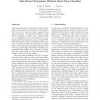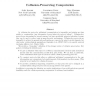1351 search results - page 270 / 271 » Trust in Anonymity Networks |
OSDI
1996
ACM
14 years 6 days ago
1996
ACM
This paper describes a mechanism by which an operating system kernel can determine with certainty that it is safe to execute a binary supplied by an untrusted source. The kernel r...
TON
2008
13 years 10 months ago
2008
We study the effectiveness of automatic patching and quantify the speed of patch or alert dissemination required for worm containment. We focus on random scanning as this is repres...
JOC
2007
13 years 10 months ago
2007
In the setting of secure multiparty computation, a set of mutually distrustful parties wish to securely compute some joint function of their inputs. In the stand-alone case, it ha...
CRYPTO
2012
Springer
12 years 1 months ago
2012
Springer
In collusion-free protocols, subliminal communication is impossible and parties are thus unable to communicate “any information beyond what the protocol allows”. Collusion-fre...
AAAI
2008
14 years 1 months ago
2008
Email client software is widely used for personal task management, a purpose for which it was not designed and is poorly suited. Past attempts to remedy the problem have focused o...


